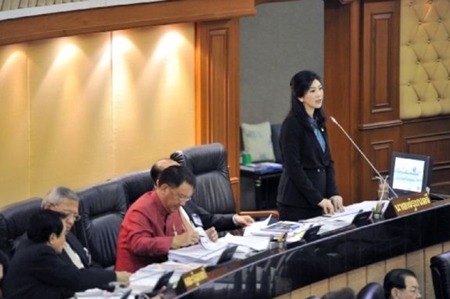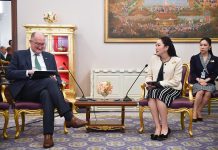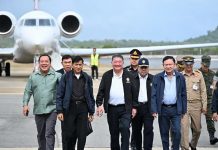BANGKOK, Sept 25 – Prime Minister Yingluck Shinawatra hailed her government for conforming to its policy on strengthening Thailand’s economy, improving the country’s competitive edge and focusing on the plight of low income people.
In her parliamentary statement on the government’s one-year performance, she said her administration has strictly adhered to its policy of balancing and expanding the economy, preparing the country to become a member of the ASEAN Economic Community (AEC), and developing technology and the industrial sector.

She said the government encountered the problem of flooding shortly after taking office and it had no choice but to cut the budget of all ministries in order to help flood-stricken people and prepare the country for future inundation.
“The government is determined to address to all kinds of problems and boost the world community’s confidence on Thailand especially among ASEAN members,” she said.
Opposition Democrat leader Abhisit Vejjajiva said Thailand’s ratings on economic efficiency, government administration and infrastructure have declined compared to the performances of the previous government in 2010, as given by a reliable international institute.
“Based on the competition index, management in the public sector has become the country’s weakness while prices of goods, oil, cooking gas and electricity have increased, in contrast to declining prices of agricultural produce. The rice pledging scheme has increased the state’s loss but only half of the subsidy reached farmers,” he said.
Mr Abhisit said the government has failed in its policy on national reconciliation and democracy reform in light of double standards.
Ms Yingluck reaffirmed the government’s determination to achieve reconciliation and that a reform assembly was set up to listen to opinion from all quarters.
Deputy Prime Minister/Finance Minister Kittiratt Na-Ranong said the government has moved forward in implementing several economic measures as announced in Parliament.
He referred to the government’s projects on tax exemption for first-car purchase, free bus and train services, price control of diesel oil and goods, increases of daily minimum wage and civil servants’ salary, and an ongoing attempt to boost Thailand’s export growth to higher than 4 per cent.
Several opposition MPs said the government has failed in its administration, especially its inefficiency in maintaining the prices of consumer products and foods which have severely affected the people.
Deputy Prime Minister/Foreign Minister Surapong Tovichakchaikul said the prime minister had to make frequent overseas trips in the first year after the widespread flooding in order to promote the country and boost foreigners’ confidence towards Thailand.




